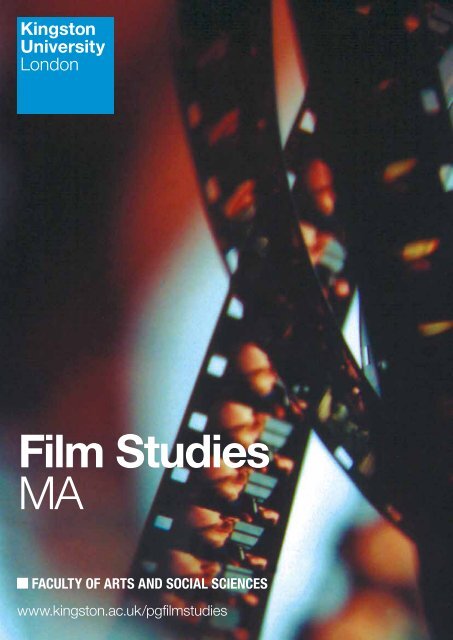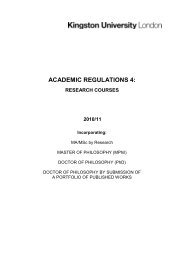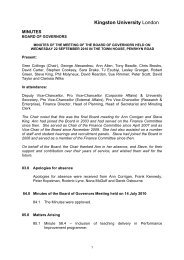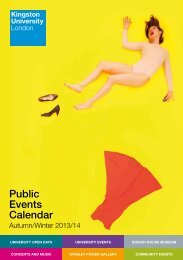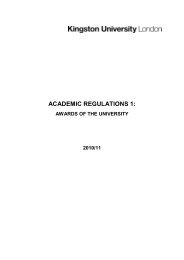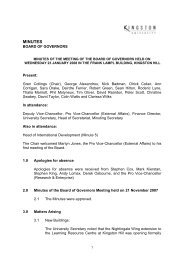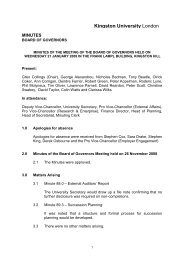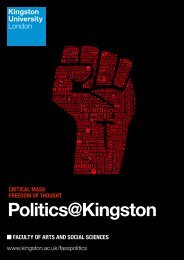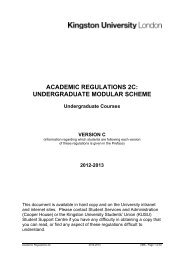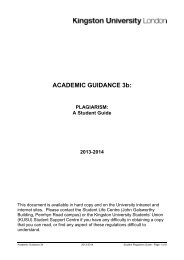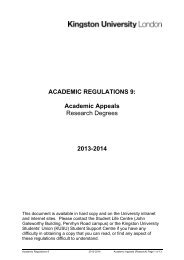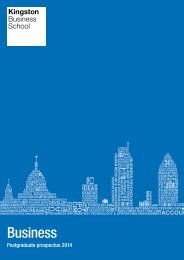Film Studies MA - Kingston University
Film Studies MA - Kingston University
Film Studies MA - Kingston University
Create successful ePaper yourself
Turn your PDF publications into a flip-book with our unique Google optimized e-Paper software.
<strong>Film</strong> <strong>Studies</strong><br />
<strong>MA</strong><br />
Faculty of Arts and Social Sciences<br />
www.kingston.ac.uk/pgfilmstudies
<strong>Film</strong> <strong>Studies</strong> <strong>MA</strong><br />
About the course<br />
Course overview<br />
The <strong>MA</strong> in <strong>Film</strong> <strong>Studies</strong> brings together people from a wide range of<br />
backgrounds and different nationalities who all share a common characteristic:<br />
a passion for contemporary cinema. The course focuses on a range of current<br />
approaches to film studies and provides an in-depth study of specific areas<br />
such as American independent, European, British and Far Eastern cinema.<br />
As a postgraduate student, you will develop a critical understanding of the<br />
importance of theory, method and analysis to the study of film, and you will be<br />
encouraged to test out original approaches, both in seminars and written work.<br />
The <strong>MA</strong> in <strong>Film</strong> <strong>Studies</strong> is jointly run, and in parts co-taught, by the fields of <strong>Film</strong><br />
<strong>Studies</strong> and Media <strong>Studies</strong>, a collaboration that ensures that students enjoy the<br />
opportunity to engage with two vibrant areas of academic fields.<br />
Building upon the specialist expertise and wide-ranging experience of<br />
colleagues from within the fields of <strong>Film</strong> <strong>Studies</strong> and Media <strong>Studies</strong>, the <strong>Film</strong><br />
<strong>Studies</strong> <strong>MA</strong> is informed by staff research into a wide variety of areas, including<br />
gender and sexuality on screen, religion, philosophy and film, censorship and<br />
ideology, industry and independents in New Hollywood, as well as cinema<br />
and media in the global context.<br />
What you will study<br />
You will study all that is new, vital and innovative in contemporary and<br />
emergent cinemas. You will evaluate and critically analyse a range of<br />
perspectives on cinema in light of contemporary developments, shifting<br />
cultural alliances and patterns of cross-fertilisations. In addition, you will be<br />
introduced to the main areas of debate in the history of film criticism. Current<br />
modules focus on American cinema (mainstream and independent), post-<br />
1960 British cinema, European cinema (with specialist studies on gender<br />
and sexuality and place and identity) and world cinema (with case studies on<br />
South-east Asia, Latin America, India and Iran). In writing your dissertation,<br />
you will demonstrate your ability to research a topic of your choice in depth,<br />
gaining a rigorous grasp of current theoretical and methodological debates<br />
relevant to the subject area, as well as an understanding of the historical and<br />
cultural context. If you are interested in further research, this course provides<br />
an excellent foundation for MPhil/PhD study.<br />
Course content<br />
The programme comprises four modules, each worth 30 credit points, and the<br />
dissertation, worth 60 credits. All students take two year-long core modules.<br />
Core modules<br />
<strong>Film</strong> History, Theory and Analysis will introduce the main areas of debate<br />
in the history of film criticism. You will develop your ability to relate critical<br />
concepts to an analysis of films, both orally and in writing.<br />
Media and Cinema in a Global Context, taught jointly by staff from<br />
postgraduate programmes of both film and media, explores some of the<br />
socio-political, cultural and ethical issues that arise around the global<br />
circulation of media and film texts, with a particular focus on diaspora<br />
cinemas and emergent Asian cinemas.<br />
In the Dissertation module, you build on the insights and skills developed<br />
in the taught modules. This independent extensive research project will be<br />
guided and supported by one-to-one supervisory tutorials as well as small<br />
group dissertation workshops focusing on specific film-related research<br />
methods. In writing the dissertation, you demonstrate your ability to research<br />
in depth a topic of your choice, with a rigorous grasp of current theoretical<br />
and methodological debates relevant to the subject area, as well as an<br />
understanding of its historical and cultural context.<br />
Careers and employability<br />
The course will equip you with the relevant research skills and prepare you for<br />
further study or for work within education, journalism, film archives, and other<br />
related areas. We also welcome students who wish to develop their personal<br />
interest in the field.<br />
Some postgraduates from the <strong>Film</strong> <strong>Studies</strong> programme have gone into academia<br />
within the field of film as teachers or lecturers or have continued their<br />
postgraduate study at PhD level, while others work in film-related industries<br />
in a variety of areas including journalism and business and enterprise.<br />
Our degree will equip you with a range of skills which make you desirable to<br />
employers in a wide range of professions. Skills such as initiative and problemsolving,<br />
teamwork, communication skills, imagination and creativity and analytical<br />
and research skills are increasingly recognised by the working world as highly<br />
valuable in careers from customer and public relations or sales and marketing<br />
to education. The creative and cultural industries are major contributors to the<br />
UK’s economy and our postgraduates have the skills they are looking for.<br />
Employability skills are developed through the embedding of key skills within the<br />
curriculum in collaboration with <strong>Kingston</strong> <strong>University</strong>’s Careers and Employability<br />
Service. We run a number of events for postgraduate students where you can<br />
seek advice, get help with your CV and meet alumni working in a range of areas.<br />
Special features<br />
• This interdisciplinary <strong>MA</strong> focuses on a range of current approaches to<br />
film studies and provides an in-depth study of specific areas of cinema.<br />
• You will have the opportunity to carry out research at the British <strong>Film</strong><br />
Institute (the largest film archive in the world), and will benefit from the<br />
impressive range of cinemas available in <strong>Kingston</strong> (with its 14-screen<br />
Odeon cinema and annual film festival) and in central London.<br />
• For those interested in further research, this course provides an excellent<br />
foundation for MPhil/PhD level study.
www.kingston.ac.uk/pgfilmstudies<br />
Teaching staff<br />
Optional modules (choose two)<br />
Cinematic Animals: Monsters, Beasts and Humans on <strong>Film</strong> examines<br />
the way in which the genres of horror and cartoon comedy splice animals<br />
and humans together to create frightening or comical visions of both. There<br />
is a long history in cinema of humanising the animal (‘anthropomorphism’)<br />
and animalising the human (‘theriomorphism’), through hybrids of animal and<br />
human beings (werewolves, man-beasts from Greek myth), or animal and<br />
human behaviour, as when feeding (vampires, zombies) or in political behaviour<br />
(invading alien monsters). We will analyse the narrational methods, cinematic<br />
technologies, ethics and politics of these films by looking at contemporary<br />
examples including Twilight, Daybreakers, Red Dragon, The Island of Dr<br />
Moreau, Splice, X-Men, Up!, Antz, Happy Feet, District 9 and Alien.<br />
Freedom, Censorship and Subversion deals with some of the most hotly<br />
debated issues in different societies about how to balance core freedoms<br />
(expression, press and protest) with the state protecting what and who may be<br />
potentially harmed by certain forms of expression through censorship. Even then,<br />
these remain open debates as new forms of subversion and resistance emerge<br />
with new technologies or through the use of the body to express protest. The<br />
module explores these at two levels. The first outlines different approaches<br />
to and principles governing censorship depending on whether expression is<br />
through images; words, ideas and beliefs; information; and action. These are<br />
then explored in more depth in sessions that draw on staff specialisms here, for<br />
instance, in film, news, information-privacy, protest movements, etc.<br />
Gender and Sexuality in Contemporary Cinema invites you to reflect on<br />
changing constructions of gender and sexuality in contemporary cinema.<br />
Theoretical approaches to gender and sexuality in film will be explored, with<br />
particular reference to notions of spectatorship and the body. You will have<br />
the opportunity to analyse the construction of gender and sexuality in a range<br />
of contemporary films, taking account of the role played by your particular<br />
historical and cultural contexts.<br />
New Hollywood: From the Mainstream to the Margins is designed to<br />
explore areas of film practice within and to some extent beyond Hollywood’s<br />
commercial orthodoxy and the mainstream national cinemas. It will develop<br />
an analysis and critique of contemporary theories and histories concerning<br />
new Hollywood and independent cinema by investigating, amongst others,<br />
the films’ formal properties, their modes of production, their audiences<br />
and their modes of consumption. Finally, it will also analyse some films that<br />
challenge or question dominant North American cultural values in relation to<br />
one or more of the key areas outlined above.<br />
Each member of the <strong>Film</strong> <strong>Studies</strong> team is an active researcher whose<br />
interests inform their teaching on the masters degree. Their areas of<br />
specialism are indicated below.<br />
We welcome approaches from postgraduate students who plan doctoral<br />
research in any of the following areas (or their interconnections).<br />
• Early and silent cinema (Simon Brown)<br />
• British (Simon Brown), French (Catherine O’Brien), German (Andrea Rinke)<br />
and Spanish (Carmen Rabalska)<br />
• Fandom, audiences, pilgrimage and cultural convergence (Will Brooker)<br />
• East Asian (Matt Melia) and Indian (Andrea Rinke)<br />
• Transnationalism and globalisation in cinema (Corin Depper, Andrea Rinke);<br />
migrant and diasporic cinema (Andrea Rinke)<br />
• Women and gender (Catherine O’Brien, Andrea Rinke) and cinematic<br />
animals (John Mullarkey)<br />
• Digitalisation (Corin Depper), philosophy (John Mullarkey, Corin Depper),<br />
religion (Catherine O’Brien) and the visual arts (Corin Depper)<br />
Student feedback<br />
“I had a wonderful time while doing the <strong>MA</strong> at <strong>Kingston</strong> <strong>University</strong>, thanks to<br />
the course director and other lecturers on the programme. Their efforts and<br />
wealth of knowledge encouraged me to do the best I could, even securing a<br />
distinction for my dissertation. The <strong>MA</strong> motivated me to opt for a PhD, and<br />
my dissertation supervisor and others assisted me on my PhD proposal,<br />
from which I secured five scholarships/teaching assistantships. <strong>Kingston</strong><br />
<strong>University</strong> changed my life!” Shweta Sharma, India<br />
“I thoroughly enjoyed studying for my <strong>MA</strong> in <strong>Film</strong> <strong>Studies</strong> at <strong>Kingston</strong>,<br />
particularly as all of the lecturers were obviously well-informed experts.<br />
The course gave me the opportunity to study aspects of cinema that I<br />
would otherwise not have been exposed to, specifically independent films<br />
and gender performance in European cinema. My aim now is to teach film<br />
studies, and I have started a PhD thesis on the silent films of John Ford.”<br />
Steve Mayhew, UK
www.kingston.ac.uk/pgfilmstudies<br />
<strong>Film</strong> <strong>Studies</strong> <strong>MA</strong><br />
Entry requirements<br />
One or more of the following:<br />
• A second-class degree or above, or equivalent, in a humanities subject or in<br />
the history of art, fine art or any other studio-based subject that includes an<br />
art historical or contextual studies component, or another relevant area<br />
• Consideration is also given to non-standard entrants with relevant work<br />
experience.<br />
All non-UK applicants must meet our English language requirements. For<br />
this course it is IELTS of 6.5 overall, with special conditions for students who<br />
require a Tier-4 student visa. Please make sure you read our full guidance<br />
about English language requirements on the course webpage, which includes<br />
details of other qualifications we’ll consider.<br />
Duration<br />
One year full time or two years part time<br />
Attendance/delivery<br />
This is a modular programme based on credit accumulation. The full <strong>MA</strong><br />
consists of four taught modules plus a dissertation. The study commitment<br />
varies depending on which course you take, but may include evening,<br />
weekend or day-release sessions and can vary from semester to semester.<br />
Timetables are subject to change. Please contact the postgraduate<br />
admissions office for further details.<br />
Assessment<br />
There is a variety of assessment methods for the course, including essays,<br />
presentations, research projects and a dissertation.<br />
Location<br />
Located beside the River Thames, <strong>Kingston</strong> <strong>University</strong> is within the<br />
London travel-pass zone. Easily accessible from surrounding areas such<br />
as Surrey and Middlesex, its local train stations (<strong>Kingston</strong>; Surbiton) are<br />
also only 25 minutes from London Waterloo.<br />
Further information<br />
Contact details<br />
Please contact the Faculty’s Admissions Office with any further queries.<br />
Admissions Office (Postgraduate Courses)<br />
Faculty of Arts and Social Sciences<br />
<strong>Kingston</strong> <strong>University</strong><br />
Penrhyn Road<br />
<strong>Kingston</strong> upon Thames<br />
Surrey KT1 2EE<br />
T: +44 (0)20 8417 2361/2378<br />
F: +44 (0)20 8417 2292<br />
E: fasspostgrad-info@kingston.ac.uk<br />
www.kingston.ac.uk/pgfilmstudies<br />
HS(13.388)L


